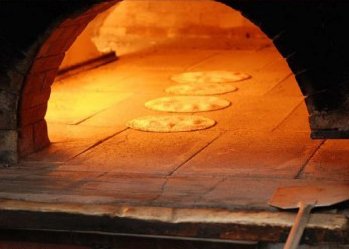|
For many decades, a matza bakery operated out of the Ashkenazi shul in Tashkent. This bakery supplied matzos to all the Jews of Uzbekistan. When Rabbi Abba Dovid Gurewitz arrived there on shlichus, he discovered that the machines were not suited to making kosher for Pesach matzos. However, this was the first year in which Ohr Avner, led by philanthropist Levi Leviav, decided to import matza from Israel.
I arrived in Tashkent a month before Pesach, to help out Rabbi Gurewitz. A few days after I arrived, I heard that the ship with the matzos had set sail and was on its way to Odessa. From there, the matzos were supposed to arrive by train at locations throughout the C.I.S. 
It was Purim night. Over a thousand Jews from Tashkent came to celebrate with Chabad at the theater hall in the center of the city. In his main address, Rabbi Gurewitz assured the people that the matzot for Pesach would be arriving shortly. He had a basis for his promise, because the ship had dropped anchor on the shores of Odessa in the Ukraine and now the matzos would be sent by train to Tashkent.
After Shabbat, Rabbi Gurewitz began making many phone calls. He heard that that dozens of tons of matza were on their way to Tashkent, but the trip had only just begun. The rules of the Train Authority in Russia said that a freight train sets out only when there are fifty cars. The train had left Odessa and it had many cars, but some of the cars were destined for stations on the way to Tashkent. When these cars were left at their stations and the train no longer had fifty cars, it would not be allowed to continue.
We were very worried. I kept thinking about what would happen if the matzos arrived late and the Jews of Tashkent would be without matzos for Pesach. There was one answer to this and that was: we knew we were shluchim of the Rebbe and the Rebbe would run the show. We could only pray that the matzos would arrive as soon as possible.
Thursday, 6 Nissan. In the morning, we found out that the matzos would be arriving. At noon, we heard the good news that the train had arrived in Tashkent. Mazal tov!
The students of the yeshiva were sent to help the porters arrange the shipment to distant locales, but as is usual in these countries, a problem arose at the last minute. Due to some technical reasons, the officials of the station refused to release the important freight.
Rabbi Gurewitz exerted pressure in the right places and after prodigious effort, the shipment, containing 30,000 packages of matzos, each weighing one kilo, was released.
Friday, 7 Nissan. A large crowd gathered early in the morning near the Ashkenazi shul. All requested and demanded matzos, but for some reason there was a delay of the truck bringing the matzos and the patience of the people was running out.
Two hours before Shabbat, the truck came with a container of 5000 packages of matza. We worked quickly to finish everything before Shabbat. We set up a human chain from the truck to the room in the shul where we stored the matza. A Jew who lived near the shul volunteered his twin ten-year-old sons to help with the matzah distribution.
Because it was so close to Shabbat, we decided not to sell any of it before Shabbat and everybody was told to come back on Sunday.
Sunday, 9 Nissan. Upon our arrival at shul, we were greeted by hundreds of Jews, some of whom had waited there since five in the morning! They all demanded matzos immediately. We knew that if we waited the line would only get longer and it would be more chaotic, so we quickly began selling matzos.
Friday, 14 Nissan, Erev Pesach. After an early morning prayer, I went to Rabbi Gurewitz’s house. The yard had been transformed into a kitchen. Dozens of students worked on preparing the food for the Seder.
We had hoped that this late in the game, everybody who wanted them had gotten matzos. But we were seriously mistaken. People continued to stream towards Rabbi Gurewitz’s house. Apparently, the supply of machine matzos had been used up and Rabbi Gurewitz decided to give out hand matzos, to ensure that Jews had matzos for Pesach.
Some young people showed up who also asked for matzos and wine. We asked them why they were showing up only now, the day before Pesach. They said that they had come from Tajikistan, where a civil war was taking place. Because of the fighting, the roads had been closed.
“We tried to come here a few times but each time the roads were closed. We continued to try, gave bribes, and drove roundabout until we managed to come here.”
We were all moved and overwhelmed. Seventy years of Communist oppression had not managed to drive out the craving for matza, “food of faith.” With G-d’s help, the matzot arrived in time and sufficed for the thousands of loyal Jews of Uzbekistan.
|

